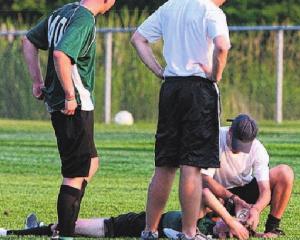
Emeritus Prof Sir Alan Mark said he understood the 28ha-to-30hafire affected a mixture of forest edge and shrubland - including dracophyllum and hebe - at the upper level of the forest, as well as some of the snow tussock grassland, including the gorse associated with those open areas.
Gorse was likely to be a more serious issue as a result of the fire than it had been, he said.
''The gorse will be encouraged more than any of the native plants as a result of the fire. It thrives on fire,'' he said.
''It's just the nature of the beast. It has shoots on the stem and they take off as a result of the fire, the impact of the fire. Broom will be the same.
''Scotch broom will also thrive on fire.''
The fire occurred on Dunedin City Council reserve land.
When asked how the council managed gorse and broom in the area, DCC parks and recreation manager Robert West said there was an annual weed monitoring and maintenance programme that included those plants.
''We have not inspected the Flagstaff fire area yet as we are not allowed into the area yet,'' he said.
''The DCC will assess the affected area then continue to monitor it.''
Prof Mark said he had not been to the site himself, but a colleague of his would be visiting the area and planned to report back on the effects of the fire.
Snow tussock would be able to recover, but hares could be an issue as the plants grew back.
The dracophyllum shrub was very vulnerable as a result of the fire, and exotic plants would do better than any of the natives, he said.
It was always a problem spraying gorse because it damaged native plants in the area as well.
The city did not have the resources to replant in the area, he said.
''Some volunteer groups may plant stuff, but getting stock to plant up there is not easy.''
Comments
What about a whole heap of volunteers (even prisoners maybe?) going up there to cut down gorse and broom, instead of spraying it. Would be a mammoth job, but after a while you'd have most of the big bushes gone, just leaving the little ones left to spray/hack at/pull out.
As far as getting the gorse etc out of there, maybe 4WD's or helicopters could be used.
It seems so bad up there that you can see it from all over the city when it's flowering.












